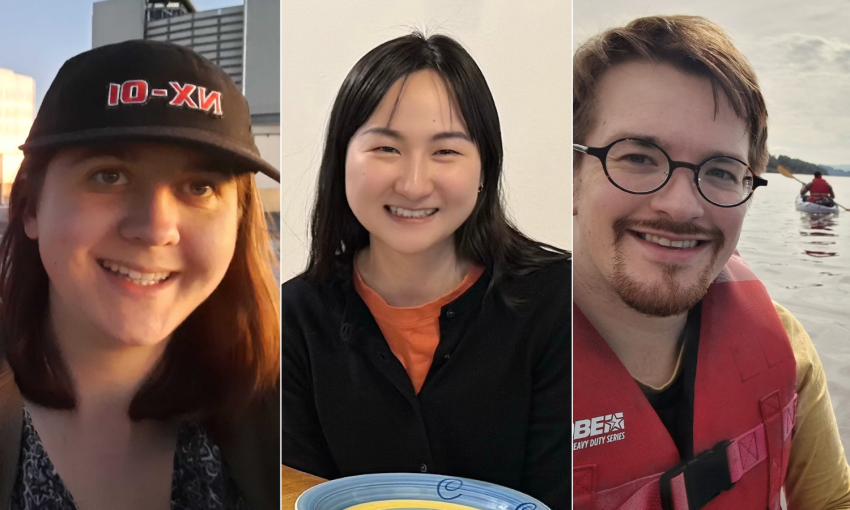The Royal Astronomical Society is pleased to announce the winners of its prizes for the best PhD theses completed in the UK in 2024.
Prizes are awarded annually: the Michael Penston Prize for the best thesis in astronomy and astrophysics, the Keith Runcorn Prize for the best thesis in geophysics and planetary science, and the Patricia Tomkins Prize for the best thesis in instrumentation science for astronomy and geophysics.
The Michael Penston Thesis Prize 2024
The Michael Penston Thesis Prize 2024 has been awarded to Dr Sophia Vaughan for the thesis entitled 'Characterising Exoplanets in Reflected Light: A pathway towards Earth-like worlds'.
Dr Vaughan completed her PhD at the University of Oxford last year and has now moved to the Max Planck Institute of Astronomy, where she has started her APEx prize fellowship.
"In this position, I am continuing to study the reflected light of exoplanets at high spectral resolution," Dr Vaughan said.
"I am looking forward to the Extremely Large Telescope and all we will achieve with it!"
The joint runners-up for the Michael Penston Thesis Prize 2024 are Dr Lili Alderson, of the University of Bristol, with a thesis entitled ‘From Hot Jupiters to Super-Earths: An Exploration of Exoplanet Atmospheres with Space-Based Telescopes’, and Dr William Baker, of the University of Cambridge, with a thesis entitled 'New Insights on the Evolutionary Mechanisms of Local and Distant Galaxies'.
The Patricia Tomkins Thesis Prize 2024
The winner of the Patricia Tomkins Thesis Prize 2024 is Dr Graeme McGhee, of the University of Glasgow, with a thesis entitled 'Studies of new materials with low mechanical and optical losses for the coatings of future gravitational wave detectors'.
Dr McGhee graduated with a masters in physics with astrophysics from the University of Glasgow in 2019, and that same year embarked on his PhD studies at Glasgow's Institute for Gravitational Research to develop new and improved mirrors for terrestrial gravitational wave detectors.
During his PhD studies he was awarded multiple research fellowships which enabled him to travel across the world to carry out important projects to facilitate detector improvements and form lasting research links at the California Institute of Technology, Claude Bernarde University in France, and the University of Toyama in Japan.
Dr McGhee is now a post-doctoral researcher based at the University of Glasgow.
"I hope to continue developing state-of-the-art optics for many more years to come, perhaps working on projects like the planned Einstein Telescope, and Cosmic Explorer observatories, or yet unknown exciting new challenges," he said.
The runner-up for the Patricia Tomkins Thesis Prize 2024 is Dr Luke Cornwell, of the University of Kent, with the thesis entitled 'New Techniques and Methods for In-Situ Orbital Debris Detectors'.
The Keith Runcorn Thesis Prize 2024
The winner of the Keith Runcorn Prize 2024 is Dr Sihui Zhong for a thesis entitled 'Decayless kink oscillations of solar coronal loops'.
After obtaining her PhD from the University of Warwick, Dr Zhong joined the Geophysical and Astrophysical Fluid Dynamics group at the University of Exeter as a postdoctoral research associate.
In September 2025, she will begin a three-year FWO postdoctoral fellowship at KU Leuven in Belgium. Her research focuses on the observational study and theoretical modelling of solar coronal waves, with a particular emphasis on kink waves in solar coronal loops.
The runner-up for the Keith Runcorn Prize 2024 is Dr Emma Thomas, of the University of Leicester, with a thesis entitled 'Infrared Observations and Investigations of Uranus’s Aurorae and Ionosphere'.
ENDS
Media contacts
Sam Tonkin
Royal Astronomical Society
Mob: +44 (0)7802 877700
Notes for editors
About the Royal Astronomical Society
The Royal Astronomical Society (RAS), founded in 1820, encourages and promotes the study of astronomy, solar-system science, geophysics and closely related branches of science.
The RAS organises scientific meetings, publishes international research and review journals, recognises outstanding achievements by the award of medals and prizes, maintains an extensive library, supports education through grants and outreach activities and represents UK astronomy nationally and internationally. Its more than 4,000 members (Fellows), a third based overseas, include scientific researchers in universities, observatories and laboratories as well as historians of astronomy and others.
The RAS accepts papers for its journals based on the principle of peer review, in which fellow experts on the editorial boards accept the paper as worth considering. The Society issues press releases based on a similar principle, but the organisations and scientists concerned have overall responsibility for their content.
Keep up with the RAS on Instagram, Bluesky, LinkedIn, Facebook and YouTube.
Download the RAS Supermassive podcast


